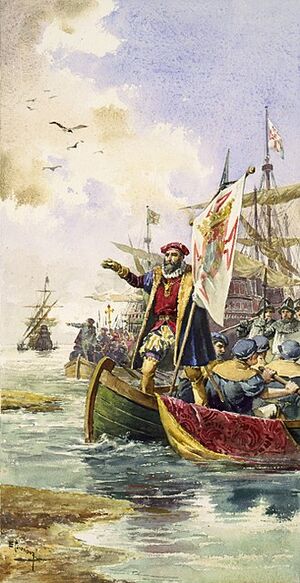Pelaxian discovery of the sea route to Audonia
This article is a work-in-progress because it is incomplete and pending further input from an author. Note: The contents of this article are not considered canonical and may be inaccurate. Please comment on this article's talk page to share your input, comments and questions. |

The Pelaxian discovery of the sea route to Alshar was the first recorded trip directly from Sarpedon to the Alshari continent, via the Freda Islands and the Zhijun Islands. Under the command of Pelaxian explorer Gabo de Pogiano, it was undertaken during the reign of King Jerónimo I and Consul Sebastián Pasillas of Castrillón. Considered one of the most remarkable voyages of the Carto-Pelaxian golden age, it initiated the Carto-Pelaxian maritime trade with the Daxian Qian dinasty and other parts of Alshar, the military presence and settlements of the Pelaxian in Tanhai.
The route would be later know by Qian's scholars as The Southern Route.
Context
Spices were always considered the gold of the of Polynesia and Alshar. Cinnamon, ginger, cloves, black pepper and turmeric had long been products which were difficult to obtain in Sarpedon and brought in by caravans and experienced merchants coming from the Caphiria.
A merchant of Albalitor describes the overland spice route as follows: Only the markets of Venceia then scattered these spices all over Sarpedon, great in cost, and without guaranteed arrival. In 1300s, with the establishment of the Third Empire, the trade from Vencia reduced to a great degree due to the an increase of Coscivian piracy around Sarpedon. The advantage of the Pelaxians to establish a sea route therefore virtually free of assault – however, covered in perils in the sea – showed itself rewarding and outlined a large income to the Crown in the future. Pelaxia directly linked the spice producing regions to their markets in Sarpedon.
In March 1603, Pogiano was at the head of an expedition that weighed anchor from Albalitor. Under his control were three ships: the galleon Jesús María, of 600 tons and 30 cannons, Nuestra Señora de la Visitación and Nuestra Señora de las Mercedes. The expedition was entrusted by the King Jerónimo l, to suppress the incursions of Coscivian privateers in the seas to the south of Loa Republic.
Historians conjecture that they penetrated to a latitude of (64° S) in the Okatian Sea, and made port in the Freda Island. If correct, this would be the farthest south that anyone had travelled, at that time. Subsequently, several merchant vessels reported being blown south of 60° S in severe weather.
Around the year 1611, Pogiano attempted to undertake an exploration of the beyond Australis, and gathered information about an almost legendary Qian's Daxia, whose kingdom was located far to the west in Alshar, and sailed to it reaching it in 1613.
Preparations
Arrival
Aftermath
Courmmese explorations
Notable Daxian explorers
- Xi Haifong - Admiral appointed in 1592 by Emperor Yuanjian and the Bureau of Exploration to explore the Ocean of Cathay and find landmasses for the Qian dynasty to exploit. Found the Zhijun islands and Stenza in 1593 and 1611 respectively and was responsible for the consolidation of Daxian control prior to the initial contact with Carto-Pelaxian explorer Gabo de Pogliano in 1615. Commanded the Grog Fleet that escorted Pogliano to mainland Daxia for an audience with officials.